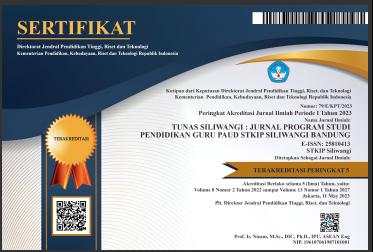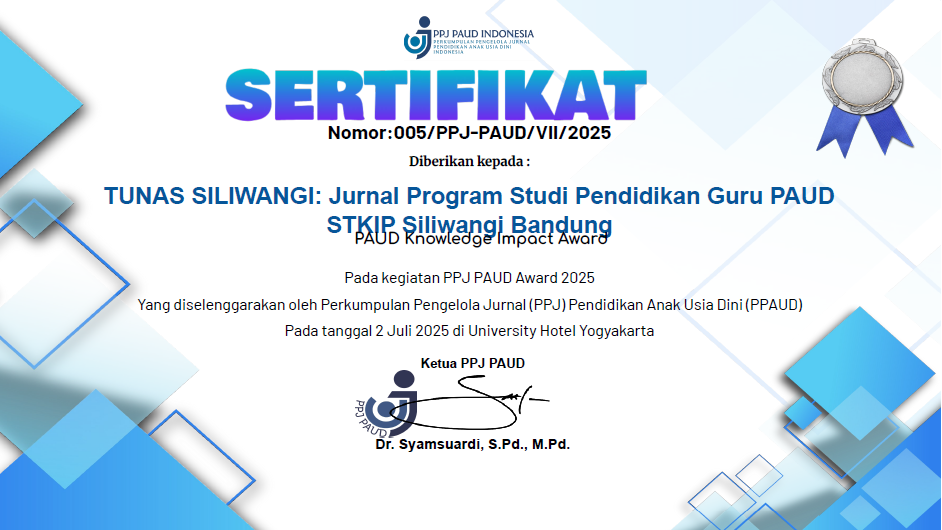Computational thinking in early childhood education: a review of theoretical and empirical perspectives
DOI:
https://doi.org/10.22460/ts.v11i2.6617Keywords:
Computational thinking, Early childhood, EducationAbstract
The rapid advancement of 21st-century technology demands the mastery of new skills, one of which is computational thinking, an essential component of basic literacy that should be introduced from early childhood. This study employs a literature review method with a qualitative approach, analyzing sources published between 2016 and 2025 to examine the development of computational thinking in early childhood education, the data collection thecniques in study were carried out through a systematic process include stages literature identification, inclusion an expanding criteria, screening an selection, data analysis was conducted using the thematic analysis method. The findings reveal that this skill can be fostered through both plugged approaches (using technology such as robots and learning applications) and unplugged approaches (games and project-based activities), which effectively enhance children’s logical reasoning, creativity, and problem-solving abilities. The success of implementation is influenced by teachers’ understanding, policy support, and parental involvement. Therefore, the introduction of computational thinking should be designed to be engaging and developmentally appropriate, serving as a strong foundation for children to face the challenges of the digital era
References
Aminiati, M., & Rohmalina, R. (2025). Urgensi Kemampuan Computional Thinking melalui Pembelajaran Coding di Satuan Pendidikan Anak Usia Dini. CERIA (Cerdas Energik Responsif Inovatif Adaptif), 8(5), 553–559. https://doi.org/10.22460/ceria.v8i5.24660
Budiyanto, C. W., Shahbodin, F., Umam, M. U. K., Isnaini, R., Rahmawati, A., & Widiastuti, I. (2021). Developing Computational Thinking Ability in Early Childhood Education: The Influence of Programming Toy on Parent-Children Engagement. International Journal of Pedagogy and Teacher Education, 5(1), 19–25. https://doi.org/10.20961/ijpte.v5i1.44397
Darmalaksana, W. (2020). Metode penelitian kualitatif studi pustaka dan studi lapangan. Pre-Print Digital Library UIN Sunan Gunung Djati Bandung.
Fajriyah, L., Rizqiyani, R., & Fitria, F. (2022). Pengembangan Kemampuan Computational Thinking Pada Anak Usia Dini: Tinjauan Sistematis Literature Review. Indonesian Journal Of Humanities And Social Sciences, 3(2), 245–255.
Harahap, M., & Eliza, D. (2022). E-Modul Pembelajaran Coding Berbasis Pengenalan Budaya Indonesia Untuk Meningkatkan Computational Thinking. Jurnal Obsesi: Jurnal Pendidikan Anak Usia Dini, 6(4), 3063–3077. https://doi.org/10.31004/obsesi.v6i4.2314
Hardiyanti, W. D., Hafidah, R., & Pudyaningtyas, A. R. (2023). Pengaruh Permainan Scratchjr Terhadap Kemampuan Berpikir Komputasional Anak Usia 5-6 Tahun. Kumara Cendekia, 11(2), 181–191.
Hartono, C. P., Agustini, K., & Sudatha, I. G. W. (2025). Systematic Literature Review: Efektivitas Pembelajaran Plugged Dan Unplugged Dalam Meningkatkan Kemampuan Berpikir Komputasional Siswa. JIIP-Jurnal Ilmiah Ilmu Pendidikan, 8(1), 1043–1050.
Hasbi, M., Nugraha, A., Mudarwan, Mumpuni, N. D., Warsito, I. H., & Sylvia, N. (2020). Penerapan Penilaian Pembelajaran Dalam Pembelajaran Coding Di Satuan PAUD. Kementerian Pendidikan Dan Kebudayaan Republik Indonesia.
Hijriati, H. (2016). Tahapan perkembangan kognitif pada masa early childhood. Bunayya: Jurnal Pendidikan Anak, 1(2), 33–49. https://doi.org/10.22373/bunayya.v1i2.2034
Holis, A. (2016). Belajar melalui bermain untuk pengembangan kreativitas dan kognitif anak usia dini. Jurnal Pendidikan UNIGA, 10(1), 23–37. https://doi.org/10.52434/jp.v10i1.84
Ibrohim, M. M., Siregar, E., & Chaeruman, U. A. (2023). Scratch and Computational Thinking in Elementary School: A Meta-analysis. Al-Ishlah: Jurnal Pendidikan, 15(2), 1839–1850.
Jannah, M. (2023). Perkembangan Otak Pada Anak Usia Dini: Kajian Dasar Neurologi Dan Islam. Bunayya: Jurnal Pendidikan Anak, 9(1), 171–180.
Kamiliyah, Z., Safa’udin, M., & Faruk, R. (2025). Program Pengenalan dan Penguatan Edukoding Pendidikan Anak Usia Dini di Desa Sidomulyo Puncu Kediri. Bhakti: Jurnal Pengabdian dan Pemberdayaan Masyarakat, 4(2), 282–289.
Kemendikdasmen. (2025). Keputusan Kepala Badan Standar, Kurikulum dan Asesmen Kementerian Pendidikan Dasar dan Menengah Nomor 046/H/KR/2025 Tentang Capaian Pembelajaran. https://kurikulum.kemdikbud.go.id/rujukan
Lamatokan, S. C., Regune, S., Benyamin, R. L., Amalia, C. K., & Syukrona, A. (2025). Peningkatan Kompetensi Guru PAUD Dalam Pembelajaran Coding Untuk Anak Usia Dini Melalui Workshop Di Kota Bekasi. Jurnal Pengabdian Masyarakat Dan Penerapan Ilmu Pengetahuan, 6(1), 28–35.
Mulyati, M. (2023). Tren Dan Pengembangan Keterampilan Berpikir Komputasional Anak Usia Dini Pada Abad 21: Perspektif Teoretis. Jurnal Obsesi: Jurnal Pendidikan Anak Usia Dini, 7(4), 4155–4165.
Mursyidah, N. H., & Mardiana, E. A. P. (2023). Pengaruh Permainan Edukasi Untuk Meningkatkan Computational Thinking Anak Usia 5-6 Tahun Menuju Society 5.0. Prosiding Seminar Nasional Kemahasiswaan, 1(1), 19–22.
Mutoharoh, H., Hufad, A., Faturrohman, M., & Rusdiyani, I. (2021). Unplugged Coding Activities For Early Childhood Problem-Solving Skills. JPUD - Jurnal Pendidikan Usia Dini, 15(1), 121–140. https://doi.org/10.21009/JPUD.151.07
Novitasari, Y., & Prastyo, D. (2020). Egosentrisme anak pada perkembangan kognitif tahap praoperasional. Jurnal Pendidikan Dan Pembelajaran Anak Usia Dini, 7(1).
Nurjanah, N. E., Hafidah, R., Syamsuddin, M. M., Pudyaningtyas, A. R., Dewi, N. K., & Sholeha, V. (2021). Dampak Aplikasi Scratchjr Terhadap Ketrampilan Problem-Solving Anak Usia Dini. Jurnal Obsesi: Jurnal Pendidikan Anak Usia Dini, 6(3), 2030–2042.
Papadakis, S. (2022). Apps To Promote Computational Thinking And Coding Skills To Young Age Children: A Pedagogical Challenge For The 21st Century Learners. Educational Process International Journal, 11(1). https://doi.org/10.22521/Edupij.2022.111.1
Rahmawati, I., & Kurniati, E. (2024). Implementation Of Unplugged Coding In Playdate. Research In Early Childhood Education And Parenting, 5(2).
Salamah, U., Rofi’ah, U. A., Hidayati, N., & Lisaniyah, F. H. (2025). Inovasi Pembelajaran Coding Hijaiyah dalam Menstimulasi Keterampilan Problem-Solving Anak Usia Dini di Era Modern. Journal of Early Childhood and Character Education, 5(1).
Uce, L. (2015). The golden age: Masa efektif merancang kualitas anak. Bunayya: Jurnal Pendidikan Anak, 1(2), 77–92. https://doi.org/10.22373/bunayya.v1i2.1322
Wati, S. A., Takumansang, R. C., Simanjuntak, A. R., & Anggraini, K. (2024). Pengaruh Media Computational Thinking Sheet For Kids (CTSK) Terhadap Aspek Perkembangan Kognitif Anak Usia 5-6 Tahun Di TK Indriyasana VII Surabaya.
Waruwu, M. (2023). Pendekatan Penelitian Pendidikan: Metode Penelitian Kualitatif, Metode Penelitian Kuantitatif dan Metode Penelitian Kombinasi (Mixed Method). Jurnal Pendidikan Tambusai, 7(1), 2896–2910. https://doi.org/10.36706/jbti.v9i2.18333
Zafrullah, Z., Gunawan, R. N., Haidir, H., & Ramadhani, A. M. (2024). Implementasi Penggunaan Kemampuan Computational Thinking Pada Sekolah Anak-Anak: Analisis Bibliometrik (2014-2024). Jurnal Binagogik, 11(2), 201–225.
Zeng, Y., Yang, W., & Bautista, A. (2023). Teaching programming and computational thinking in early childhood education: a case study of content knowledge and pedagogical knowledge. Frontiers in Psychology, 14.
Downloads
Published
Issue
Section
License
Copyright (c) 2025 Rita Nurunnisa, Heri Hidayat, Ghina Wulansuci

This work is licensed under a Creative Commons Attribution-ShareAlike 4.0 International License.
The author is responsible for acquiring the permission(s) to reproduce any copyrighted figures, tables, data, or text that are being used in the submitted paper. Authors should note that text quotations of more than 250 words from a published or copyrighted work will require grant of permission from the original publisher to reprint. The written permission letter(s) must be submitted together with the manuscript.







